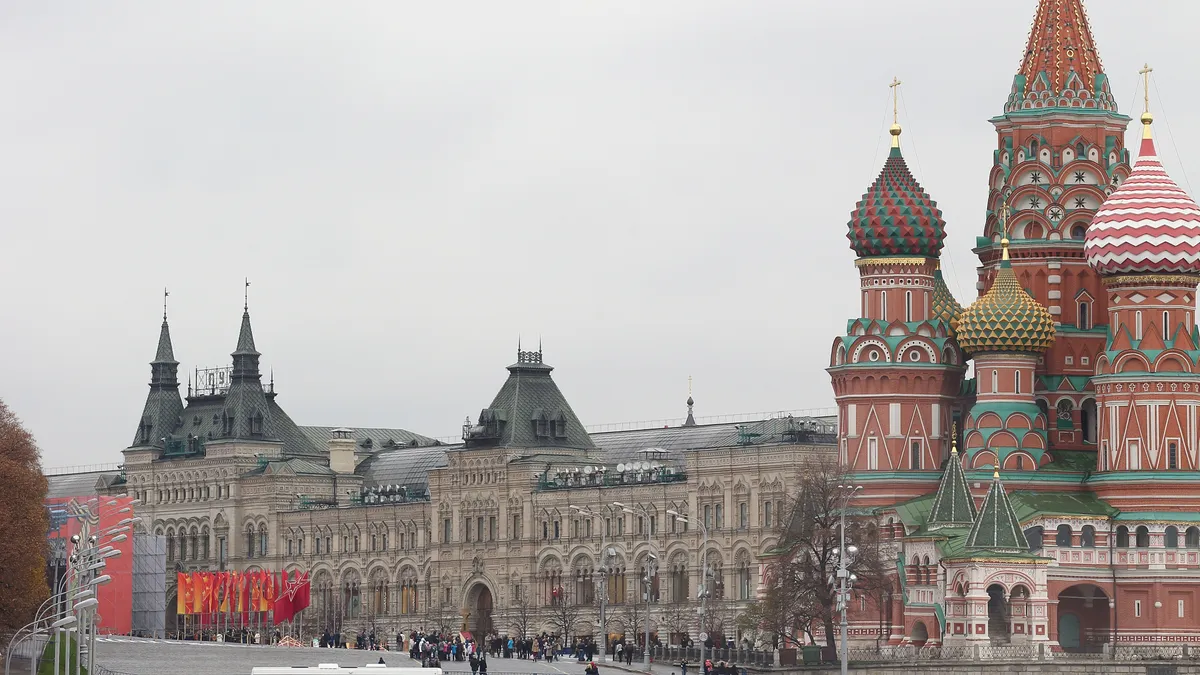The Treasury Department’s Office of Foreign Assets Control (OFAC) imposed sanctions Thursday on Russia’s two largest banks in response to the country's invasion of Ukraine earlier in the day.
The banks, Sberbank and VTB Bank, together hold more than half of the assets in Russia's banking system. But the severity of penalties against each varied.
OFAC banned U.S. financial institutions from opening or maintaining correspondent banking accounts for Sberbank and 25 foreign subsidiaries beginning March 26. Payments that Sberbank attempts to process in U.S. dollars will be disrupted and rejected once the payment hits a U.S. financial institution, the Treasury arm said.
Sanctions against VTB Bank, which is majority-owned by the Russian government, and 20 of its subsidiaries, had swifter effect. VTB-tied assets that are held in U.S. financial institutions will be instantly frozen and inaccessible to the Kremlin, the Treasury Department said.
OFAC imposed similar “blocking” sanctions Thursday against fellow Russian banks Otkritie, Novikom and Sovcom, and expanded the number of Russian entities that fall under stricter rules around new debt and equity to include Sberbank, Gazprombank and Russian Agricultural Bank.
“[Russian President Vladimir] Putin chose this war, and now he and his country will bear the consequences,” President Joe Biden said Thursday. “This is going to impose severe cost on the Russian economy, both immediately and over time.”
The U.S., however, stopped short of advocating for cutting Russia’s access to the Society for Worldwide Interbank Financial Telecommunication (SWIFT), a Belgium-based global financial messaging service.
Biden, though, said that’s “always an option, but right now, that’s not the position the rest of Europe wants to take."
British Prime Minister Boris Johnson, on a G-7 call Thursday, said he pushed “very hard” to remove Russia from the Belgian network, but told Parliament it was “vital that we have unity” on the issue among western allies, according to the Financial Times. Several Baltic nations and Canada also urged Russia’s dismissal from SWIFT. German Chancellor Olaf Scholz, however, opposed including such a measure in the European Union’s sanctions package.
Only one other country — Iran — has been blocked from SWIFT. The financial messaging service cut ties with the nation’s banks in 2018 to avoid violating U.S. sanctions related to Iran’s nuclear policy.
If Russia were to be ousted from SWIFT, it could still fall back on its own payment messaging organization, the System for Transfer of Financial Messages, or potentially use the Cross-Border Interbank Payment System, operated by its ally, China.
Foreign exchanges could also take place over less efficient means, such as email or telex — or payment apps. To that end, Lithuanian outlet Paysera halted transfers in and out of Russia on Thursday and suggested other companies do likewise, according to American Banker.
Daniel Tannebaum, head of sanctions at the law firm Oliver Wyman, told Bloomberg designating banks by name in sanctions is “a far more effective way of punishing Russia” than pulling SWIFT access.
Still, Republican and Democratic lawmakers alike pushed Biden to take a stronger stance with regard to SWIFT, too.
“Congress and the Biden administration must not shy away from any options,” Senate Foreign Relations Committee Chair Bob Menendez, D-NJ, said Thursday, adding he pressed Biden to “impose maximum costs on Putin.”
“If it’s not today, I’m willing to listen to arguments about when it should be imposed, but that’s the kind of sanction that could really have a substantial impact, and they have to be hit hard,” Sen. Bob Casey, D-PA, said, according to Bloomberg.
Biden said he was conscious of the ripple effect sanctions may have in the oil and gas market and said he would “do everything in my power to limit the pain the American people are feeling at the gas pump,” calling that prospect “critical.”
However, Pat Toomey, R-PA, the Senate Banking Committee’s ranking member, said “crippling” sanctions on Russia’s oil and gas sector — and “Iran-style secondary sanctions on Russian banks” — were necessary to “force the world to choose between doing business with Russia or the United States.
Thursday's moves come in addition to sanctions the Treasury Department imposed Tuesday on two state-owned Russian banks — Vnesheconombank (VEB) and Promsvyazbank (PSB) — and their 42 subsidiaries.
PSB acts as a military bank for Russia, overseeing almost 70% of the country's defense contracts and providing personal finance to Russian military personnel, Treasury said.






















